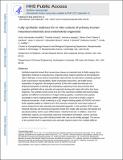Fully synthetic matrices for in vitro culture of primary human intestinal enteroids and endometrial organoids
Author(s)
Hernandez-Gordillo, Victor; Kassis, Timothy; Lampejo, Arinola; Choi, GiHun; Gamboa, Mario E; Gnecco, Juan S; Brown, Alexander; Breault, David T; Carrier, Rebecca; Griffith, Linda G; ... Show more Show less
DownloadAccepted version (3.847Mb)
Publisher with Creative Commons License
Publisher with Creative Commons License
Creative Commons Attribution
Terms of use
Metadata
Show full item recordAbstract
© 2020 Epithelial organoids derived from human donor tissues are important tools in fields ranging from regenerative medicine to drug discovery. Organoid culture requires expansion of stem/progenitor cells in Matrigel, a tumor-derived extracellular matrix (ECM). An alternative completely synthetic ECM could improve reproducibility, clarify mechanistic phenomena, and enable human implantation of organoids. We designed synthetic ECMs with tunable biomolecular and biophysical properties to identify gel compositions supporting human tissue-derived stem/progenitor epithelial cells as enteroids and organoids starting with single cells rather than tissue fragments. The synthetic ECMs consist of 8-arm PEG-macromers modified with ECM-binding peptides and different combinations of integrin-binding peptides, crosslinked with peptides susceptible to matrix metalloprotease (MMP) degradation, and tuned to exhibit a range of biophysical properties. A gel containing an α2β1 integrin-binding peptide (GFOGER) and matrix binder peptides grafted to a 20 kDa 8-arm PEG macromer showed the most robust support of human duodenal and colon enteroids and endometrial organoids. In this synthetic ECM, human intestinal enteroids and endometrial organoids emerge from single cells and show cell-specific and apicobasal polarity markers upon differentiation. Intestinal enteroids, in addition, retain their proliferative capacity, are functionally responsive to basolateral stimulation, express canonical markers of intestinal crypt cells including Paneth cells, and can be serially passaged. The success of this synthetic ECM in supporting human postnatal organoid culture from multiple different donors and from both the intestine and endometrium suggests it may be broadly useful for other epithelial organoid culture.
Date issued
2020Department
Massachusetts Institute of Technology. Center for Gynepathology Research; Massachusetts Institute of Technology. Department of Biological EngineeringJournal
Biomaterials
Publisher
Elsevier BV